Embarking on a road trip can offer the best adventures, without breaking the bank. However, expenses can quickly add up, particularly when it comes to dining out. With a little planning and creativity, you can save a significant amount of money by taking your own food and cooking in hotel rooms along the way. Not only will you cut costs, but you’ll also have the opportunity to enjoy delicious, home-cooked meals even when you’re far from home. In this article, we’ll explore practical tips and ideas for saving money on a road trip by preparing your own meals in hotel rooms.
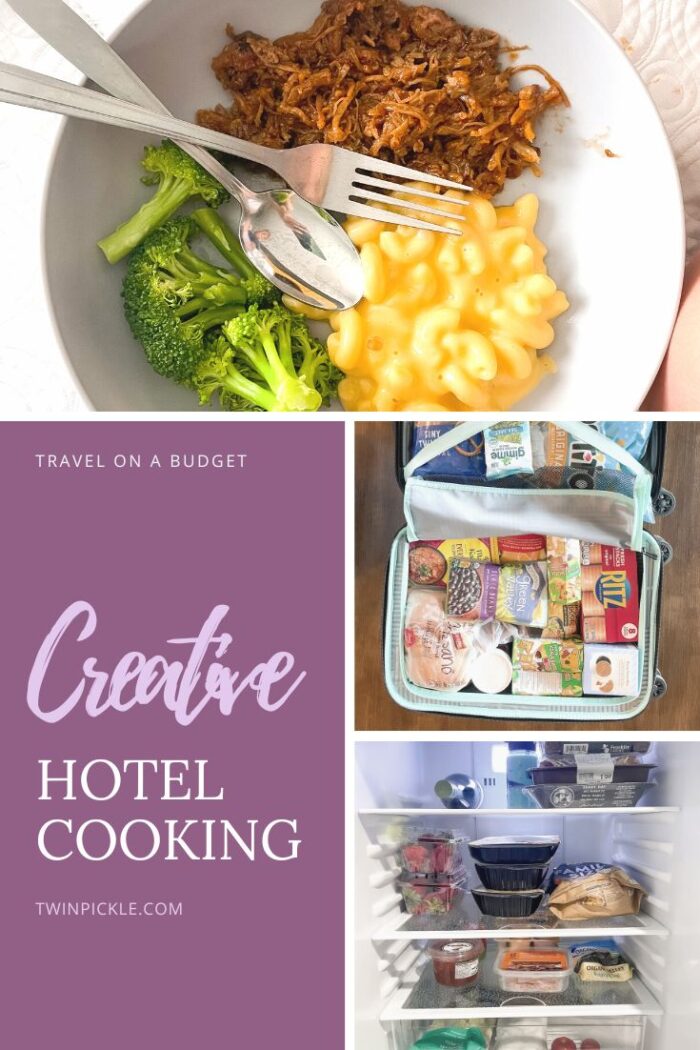
This post contains affiliate links. This means I may get a commission if you decide to purchase one of the products or services I link to. For more information, read my Privacy Policy
I occasionally travel on my own with our three children. We recently enjoyed a week-long road trip through Utah. I adore rural Utah, it’s stunningly beautiful and full of friendly people. But, when you get out of the cities, the food offerings are not always great, and in the tourist hotspots, you often can’t book and find yourself waiting in line with multiple tired, hungry kids at your feet, not ideal. I decided to do our best to pack our own food and cook in our hotel rooms. This was not only convenient in out-of-the-way locations, but it also saved us money and a lot of stress. There are some key points to consider when planning hotel cooking, especially if you’re traveling as a family.
Plan Your Hotel Cooking:
Before hitting the road, create a meal plan for the duration of your trip. This is absolutely key to being able to pack efficiently and avoid waste. During the day you’ll likely be on the road out enjoying activities so plan for convenience with sandwiches, wraps, simple salads etc. For hotel cooking, I focus on dinner and tend to book hotels that offer free breakfast. If you have the time, you can cook meals in advance and simply heat them up in the hotel microwave but there are also lots of meals which can be bought ready to go. Here are some dinner meal recommendations:
Pasta dishes:
Reheat individual portions of your favorite pasta dish in the microwave, adding a sprinkle of cheese before serving. You can buy microwave-ready mac-n-cheese which we used as a side dish.
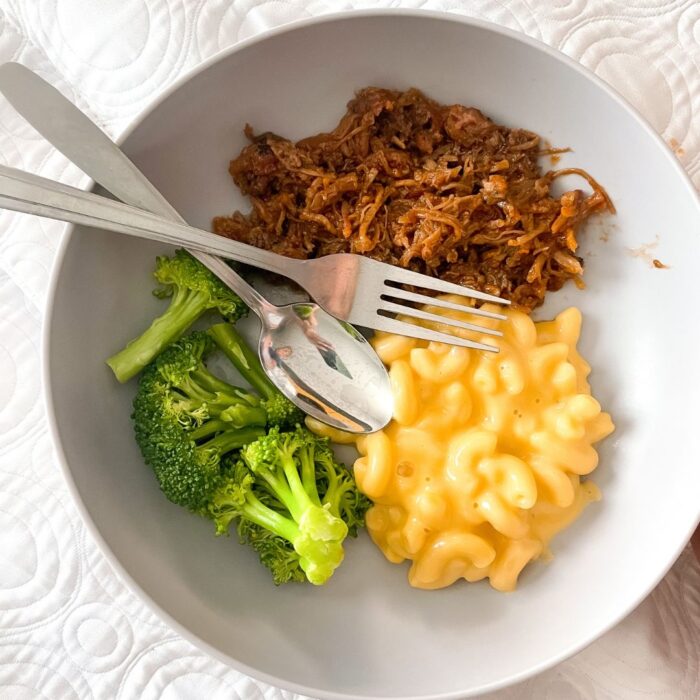
Rice:
I’m always cautious with reheating rice because if it’s not kept cool it can cause some of the worst food poisoning you’ll ever experience. Having said that, you can buy pre-cooked rice which is safely packaged, doesn’t need to be refrigerated, and is designed to reheat in the microwave. This off-the-shelf, throw-in-the-suitcase benefit of pre-cooked rice makes it one of my favorite meals for hotel cooking. Pair with:
Taco bowls:
Most grocery stores sell pre-cooked shredded carnitas which heats up in the microwave. Add some smashed avocado, some pickled red onion, and a sprinkle of cheese. I’m currently eating vegetarian and took a pouch (cans are heavy) of black beans and corn while the kids had their meat.
Curry:
You can buy ready-made curries in pouches, which like the rice do not need refrigerating. I ate a delicious lentil curry while we went away and both the curry and the rice came straight out of the suitcase, no fridge was needed.
Meatballs/Shrimp/Chicken:
Many grocery stores offer ready-to-go entrees. We picked up some meatballs in marinara sauce at Sprouts. They also had some delicious-looking shrimp to reheat as well as other protein offerings.
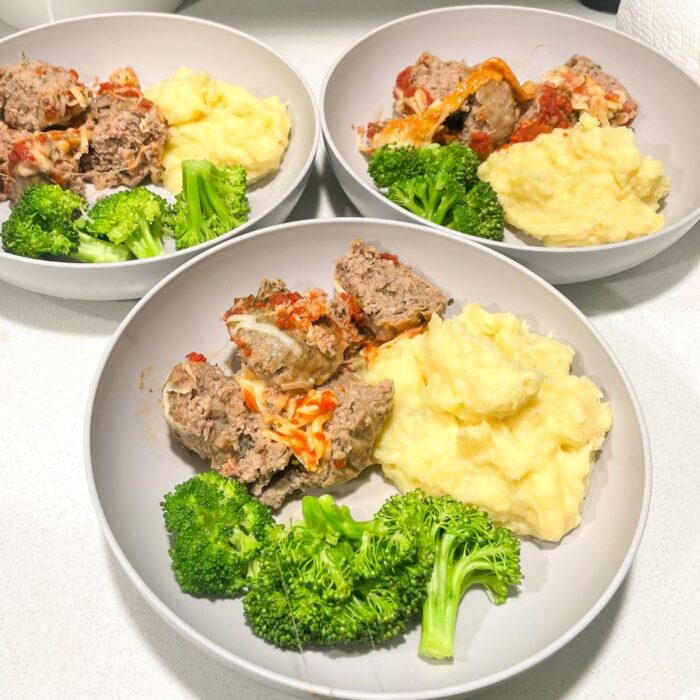
Soups and stews:
A hearty vegetable, chicken, or bean-based soup or stew can be easily reheated in the microwave. Choose cartons or plastic containers over cans to save on weight and serve with a hunk of bread or top with croutons to make sure everyone’s full.
Potatoes:
You can bake potatoes in the microwave until tender, and then top them with various toppings like cheese, chili, sour cream, bacon bits, or chives. This would however be time-consuming for families and I would recommend cooking your potatoes in advance and simply reheating individual potatoes while hotel cooking. We took a packet of ready-made mashed potatoes as a side dish which just needed heating in the microwave.
Burritos or wraps:
Similar to the taco bowls mentioned above, wrapped up! Assemble burritos or wraps with fillings like cooked chicken or beef, rice, beans, cheese, and salsa. Remember that you can not put metal foil in a microwave, so do not wrap your burrito in foil.
Dried Raman/Pot Noodles:
Those packets of dried noodles are not the most exciting of nutritious, but topped with some reheated chicken and steamed veggies they can make for some delicious hotel cooking. I cooked our ramen packets in the microwave individually in a bowl with a cup of water. Just watch for them boiling over.
Don’t forget your greens:
It’s surprisingly easy to steam vegetables in a microwave if you remember to pack your cling wrap. For example, put broccoli florets in a microwavable bowl, add half a cup of water, cover with cling wrap, and cook on high for 2mins.
Pack a Cooler:
Invest in a reliable cooler to keep perishable items fresh during your journey. Keep in mind that (depending on the size) your cooler space will be limited. Try and come up with as many meals as possible which do not require the cooler. Think bread, tortilla chips, dried ramen noodles… dry food is your friend. Fill your cooler with essentials like fruits, vegetables, yogurt, cheese, deli meats, and milk. We use a 60qt Igloo cooler.
[easy-image-collage id=8920]I would recommend getting a cooler with wheels. You do not know how far you’ll be traveling from your car to your hotel room on foot and you do not want to be carrying a huge cooler along with all your luggage.
Keeping your cooler cool
When you leave home you can pack your cooler with ice packs to keep everything chilled. However, not all hotels will have a freezer space within the fridge that can refreeze those packs. Hotels do usually have an ice machine, therefore be sure to take some zip-lock bags which you can fill with ice when you’re ready to hit the road.
Utilize Hotel Amenities:
Check hotel amenities before booking your accommodations.
The Fridge
For our week-long road trip, I upgraded our hotel for the first couple of nights to a room with a full-sized fridge/freezer. This way I could easily empty the contents of my cooler and know my food was safe.

Remember that most hotel refrigerators are very small and will not fit the contents of a large cooler. If you get to a hotel and find your fridge is not big enough, don’t panic. Keep the extra food in the cooler and add a ziplock of ice from the ice machine to keep things cool. Prioritize the coolest spots with meats and dairy while fruits and veggies will be fine remaining in the cooler. When you first check-in, look at the cool setting inside the fridge if it has one. Some hotels have their default fridge temperature high to save energy costs, so turn the power up to the middle if its set to a minimum.
Hotel Cooking Appliances
most hotels provide in-room microwaves, but they are often smaller than the one in your kitchen. Keep in mind you’ll most likely be reheating individual portions, not a family-sized lasagne. Consider your options carefully, a room upgrade to provide a small kitchenette usually pays for itself in savings over restaurant eating. Check photos of hotel rooms carefully so you know what you can expect. One night we found a great motel that had a little kitchen complete with pots and pans. We took cheese tortellini to boiling in a pan which my kids always enjoy.
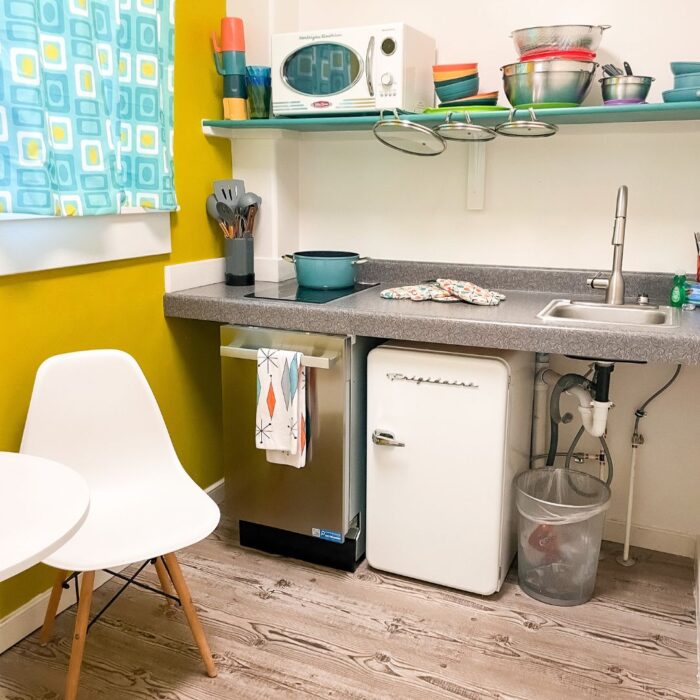
Utensils, Bowls & Cleaning Up:
Opt for recipes that require minimal cookware and cleanup. Cleaning up can be an unexpected complication if your only basin is a small bathroom basin. I usually washed up in the bathtub, the kids thought it was hilarious, but it works. I recommend eating out of microwavable plastic bowls because they are light, don’t break and anything can go in a bowl. Pack some basic utensils such as a sharp knife (those small serrated vegetable knives over a large weapon) and a peeler. Always clean up as soon as you can after eating. Although some foods can cause smells, if you clean up after you eat and wash out any containers you are throwing away it makes a big difference.
Pack Backup Emergency Food:
Things don’t always go to plan. Maybe you turn up at your hotel and the microwave doesn’t work. Maybe you trip and your noodles hit the floor. Always have a backup plan. I recommend always having bread or tortillas (which don’t squash like bread) which can be partnered with peanut butter, Nutella, canned tuna, or cream cheese. Dried fruits, chips, and other lunch-box-type items can be used for lunch but make a perfectly good emergency dinner.

Grocery Store Pit Stops for Hotel Cooking:
Take advantage of grocery stores along your route. Our recent trip was a week and we packed food for 4-5 days. Beyond this and the cooler and fridge space would have been challenging if we wanted to eat good food. One trip to the grocery store and we were set!
It does take some planning, but hotel cooking made our trip a lot easier. I didn’t need to drag the kids out late after hiking when they were tired, and I didn’t have to worry about finding food they will eat. Once the hard work was done I reaped the benefits of the convenience and saved money along the way. Give it a go!

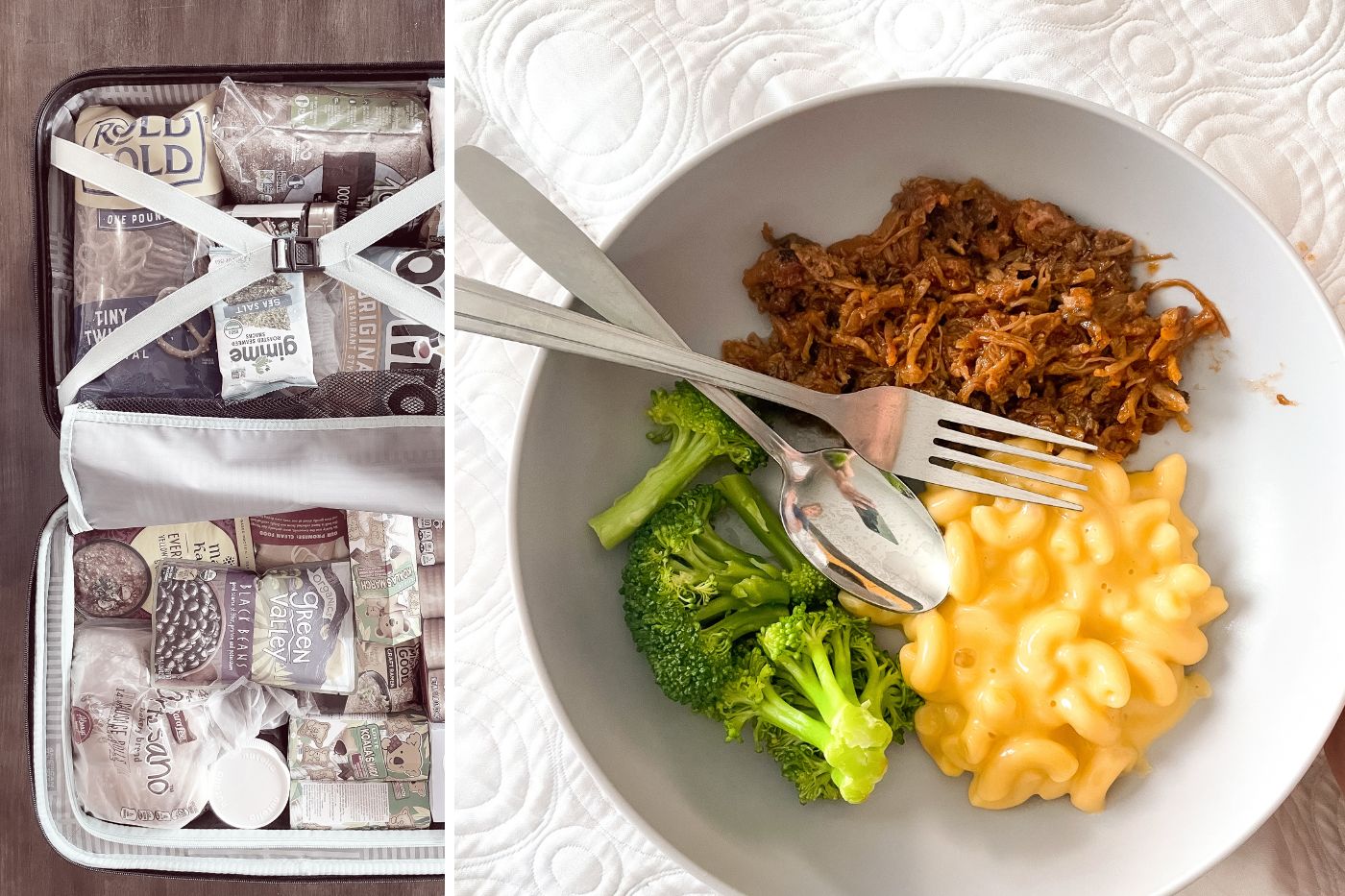
5 responses to “Creative Hotel Cooking: Save the Stress”
Your approach to hotel cooking is truly inspiring! Your thoughtful planning and creative meal ideas not only saved you money but also ensured your family enjoyed delicious, home-cooked meals during your road trip. Your tips on utilizing hotel amenities, packing smartly, and having backup options show your resourcefulness. Your experience is a wonderful example of how a little preparation can lead to a stress-free and enjoyable journey. Your insights will undoubtedly help other families looking to make the most of their travel experiences.
[…] spending a lot. But, dining out can get expensive fast. With some planning and creativity, you can save a lot of money by bringing your own food and cooking in hotel rooms. This way, you’ll spend less and enjoy […]
[…] an excel spreadsheet can help. It can make meal planning more creative and fun. Start exploring hotel-inspired recipes to save money and make your meals more […]
[…] Try making meals like pre-made gyros or a buffalo chicken salad for simple microwave cooking. To be on the safe side, 70% of travelers suggest keeping snacks like peanut butter and canned tuna handy10. […]
This is so sigma. I used all these tips!